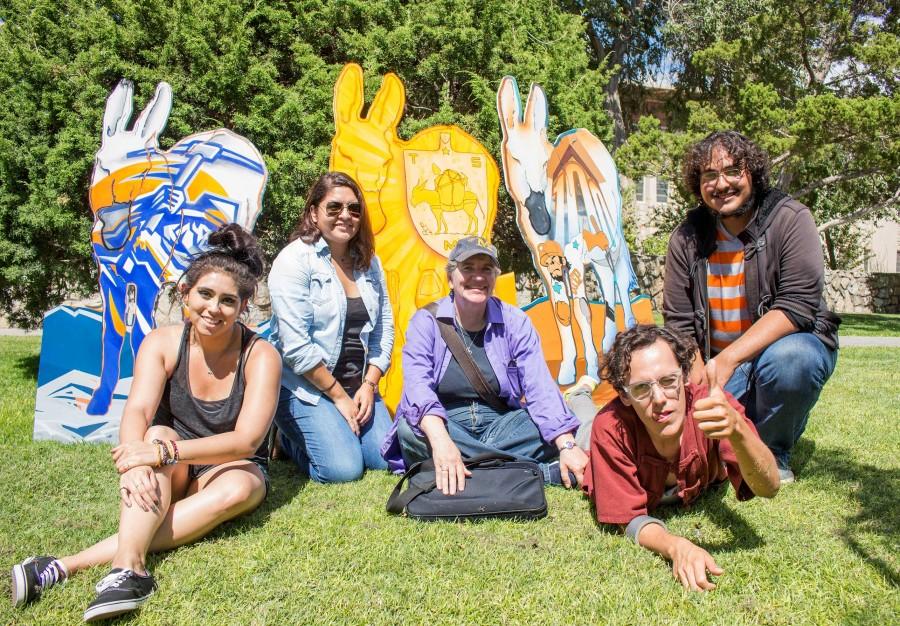On a seemingly normal day, a couple of UTEP students walked from the UTEP Library to the Rescue Mission of El Paso, a homeless shelter, for food, spearheading what would became the Miner Connection, a student-driven food pantry.
Esther Zapata, a UTEP alumni and one of the Miner Connection founders, said that after she and her collegues witnessed the two students walking to the rescue mission, they decided they wanted to do something about it.
“We decided that, that wasn’t right,” Zapata said. “The easiest thing to do was to study food insecurity on campus. We did not know at that time it was going to evolve to this (Miner Connection).”
The organization was officially launched on Wednesday, Sept. 23 at the Liberal Arts Building Lawn, a process that took over a year.
“It became official and we’re celebrating as having a space designated for our donations,” said Leonardo Gamboa, president of Miner Connection and senior organizational and corporate communication major. “There’s power in numbers and we want everyone to be a part of our family.”
Present at the event were organizations that support Miner Connection, such as the Student Government Association, UTEP Athletics, American Marketing Association, Texas Freedom Network UTEP chapter and Uptown Cheapskate.
According to an academic paper titled, “Student food insecurity: The skeleton in the university closet,” food security is a basic human right that exists when people have access to sufficient, safe and nutritious food to meet their dietary needs.
Food insecurity broadly refers to experiencing hunger due to the absence of food.
Zapata said, that after doing research, they found that it reveals contrasting figures and that more research at the national level needs to be done, something Miner Connection aims to do in the future.
A 2014 study by the University of Oregon found that 59 percent of their students suffered from food insecurity at one point within the previous year, while a University of Hawaii at Manoa study found that 21 percent of students were food insecure.
“All the research shows that the numbers are in the double digits, none of the research shows that we are in the one percent,” Zapata said. “So the UTEP numbers can be extremely high, we do not know this, what we actually need is to buckle down and do more research.”
Besides investigating research, the Miner Connection founders looked at UTEP figures to arrive at an estimation of how many UTEP students suffer from food insecurity.
They found that 60 students are registered with Foster Homeless Adopted Resources, a UTEP resource center for homeless or adopted youth, and that about 4,000 student are living on $12,000 or less a year. The 2015 federal poverty guideline for a household of one is $11,770.
“That’s about 16 to 17 percent of the entire UTEP population,” Gamboa said. “If you compare that to school expenses and rising tuition, this really puts a toll on students’ access to food based on not being able to afford it.”
After delving into the research, Zapata said, they decided that having a food pantry was the most immediate solution to help students who experience food insecurity.
“The solution is not a donation, the solution is actually solving the problem,” Zapata said. “How can we help you right now? And this is what Miner Connection is, it’s the now.”
After deciding a food pantry would be the best way to help students who experience food insecurity, they started a petition where students could indicate their solidarity for more awareness about the issue and having a food pantry as a remedy. They did more research to understand how a food pantry works and how it can be sustained, and they worked with the administration to negotiate a proposal to start the food pantry.
“These were the students who put themselves together and said let’s make sure we have some structure to this idea,” said Martina Myers, lecturer in communication and advisor for Miner Connection.
Students can donate or pick up food items at Union West, room 112. Nothing is required to pick up food items; it’s open to all UTEP students, faculty and staff.
“We need to know more about them, but we know they exist,” Gamboa said. “By making it as easy for them to access that resource as possible, we’re addressing that issue.”
Maria Esquinca may be reached at [email protected].










